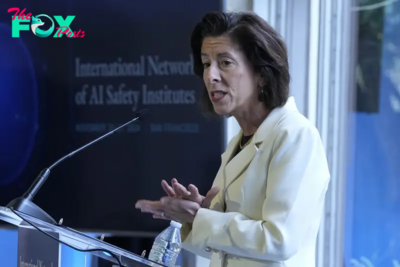US News
As Her Clinic Pauses IVF, an Alabama Doctor on What’s Next After the Court’s Embryo Ruling
The Alabama state supreme court’s ruling that frozen embryos are considered children under state law has sent shock waves through the world of reproductive medicine.
Infertility specialists and legal experts have said the ruling could have profound ramifications for would-be parents and physicians. Some patients have been scrambling to move their frozen embryos into storage in other states, and by Thursday, at least two of Alabama’s eight in vitro fertilization (IVF) providers, the University of Alabama at Birmingham and Alabama Fertility, had decided to temporarily pause treatment.
“We're getting all sorts of calls that are very valid from patients who are extremely stressed and concerned about what this means for them and their specific care,” says Dr. Beth Malizia, a physician at Alabama Fertility in Birmingham.
The first-of-its-kind ruling has raised a host of unprecedented legal questions about whether unused embryos can be discarded without civil or criminal exposure or if those embryos have an independent right to be implanted and gestated to birth, sparking a rush of panic from the thousands of families in Alabama whose hopes for children depend on assisted reproduction.
Families typically turn to IVF treatment due to fertility loss. About 2% of babies born in the U.S. are from IVF, an emotionally and physically exhausting process by which doctors typically extract as many eggs as possible from a woman, fertilize them to create embryos, and then either implant them to create a pregnancy or freeze them for later use.
Malizia spoke with TIME about the ramifications of last week’s decision and what her office plans to do for their patients.
The following conversation has been lightly edited and condensed for clarity.
TIME: Alabama already had some of the strictest abortion laws in the nation. How did you react when you heard the state Supreme Court went a step further and ruled that frozen embryos are people?
Malizia: Very distressed. Really disappointed in the ruling for many reasons, mainly for the physicians, our patients, and everyone who supports the right to have children, when to have them and the ability to do that with medical treatment when needed.
Since this ruling is the first of its kind, how are IVF clinics like the one you work at dealing with this? Are you waiting for legal guidance on how you can proceed or are you continuing to see new patients?
This is a very, very fluid process. As you can imagine, if we had talked yesterday, I might have a different answer to what I have today. We have made some decisions along the way to temporarily hold several patients and for others to modify their treatment plan. Trying to do that in a very patient specific and thoughtful way that ensures their safety as well as making sure that we have lab protocols and things in place to ensure the safety of our clinic and our embryologist. We've had to modify things tremendously. And the hope is that this is a temporary situation.

Typically, fertility doctors discard the embryos that are not perfect or if the family doesn’t want to use them. But under the current ruling, will women have to implant—or store—those embryos that would normally be discarded?
Through the IVF process, egg and sperm come together and they create an embryo. The embryo is watched in the laboratory, and an embryo that makes it to a blastocyst stage, which is about day five to six of development, is an embryo that can either be transferred into the uterus or frozen for future use. Those options are available to us because we've spent the last 40 years in the field developing and honing lots of scientific advances to enable us to focus on getting couples the ability to have a Healthy child.
So when we start talking about ‘what can we do, what can we not do’ — that's a piece of the puzzle. That is very difficult to answer at this point. We are in the process of coming up with a plan through the help of our lab director and our counsel, both local and national counsel, to come up with a plan that is safe for patients and enables us to continue to care for patients in Alabama so we are not closing our doors. Our clinic is not closing. We continue to see patients every single day. For those patients who were about to have very specific pieces of their treatment, those have been modified.
Already your clinic has decided to hold new IVF treatments due to the legal risk. Do you think some IVF clinics in Alabama will ultimately close or relocate because the risks are too extreme? Or do you think the Alabama legislature will limit the impacts of the ruling?
I am extremely hopeful that, for all people in the state, equal access and the right to have children and when to have them is something that our legislature believes. And I think they do. I think the right to have children is not really what people were intending to limit here. We as physicians in the state of Alabama who do this and who have trained for 11 to 12 years in addition to our college training hope to be part of a solution to this issue.
What kinds of questions and concerns are you hearing from patients with existing embryos and families hoping to undergo IVF?
We're getting all sorts of calls that are very valid from patients who are extremely stressed and concerned about what this means for them and their specific care. We are taking those calls basically one-by-one. Physicians are calling patients directly, especially those that are actively in treatment to discuss their care and any modifications that might need to be made for patients that have embryos in storage here. We have tried to take a deep breath and let them know that their embryos are safe in our storage facility—that has not changed from last week. And we hope and expect to have options for them to discuss what they would like to do in terms of their embryos. The couples are the ones making these decisions about what happens to their embryos and when that happens. I feel very strongly that that is their decision to make, obviously with the help of their physician.
Should Alabama families that were hoping to undergo IVF treatment be thinking about transferring their frozen embryos out of state?
For now, what I'm recommending for my patients specifically is that if they have embryos in cryo-storage that they are not intending to use right this moment, that they maintain those embryos in cryo-storage. Let us take a deep breath. Let us hope and expect that the legislature will open this back up in terms of having their normal treatment options. And if that turns out not to be the case, and they feel strongly about relocating their embryos, it is certainly their right to do that.
Are you worried that other red states could follow Alabama’s lead and rule that embryos can be considered human under state law?
For sure, yeah. I think that that is why we have so much support right now from the American Society for Reproductive Medicine (ASRM), which is our national agency, as well as RESOLVE, which is a patient advocacy agency. There's lots of national support surrounding this issue. We as fertility physicians would love to see federal legislation that protects the right of women and families to have children and to see that right protected throughout the country, not just in the state of Alabama. So I think there's an immense concern from, not just us and dealing with it on the ground, but with those states that may look to this as a way for them to follow suit.
What are some of the financial ramifications of the court ruling on patients? Could it cost Alabama women more money to undergo IVF procedures because of these risks, especially if doctors are concerned about having leftover embryos?
More and more employers throughout the country, federally and statewide in Alabama have chosen to include fertility care access for their employees, and that's been a fantastic way to ensure that we have equal access to the right to have children when couples desire that.
The ability to then sort of turn around and now limit that access is really hard. It feels like a large step backwards when we were feeling hopeful that we were expanding access. We spend our whole training, learning and trying to get information out to patients that when they're struggling with fertility issues, that they are not alone, that they have medical solutions to many of the issues that we can help them to have the baby that they would like to have. So to have this sort of turnaround is an extremely distressing piece of this puzzle, especially when we are optimistic about improving access.
Are there other ramifications of the court ruling?
There are likely lots of unintentional consequences that come from this ruling and I don't know that the courts considered all of those things. I've had patients ask me about their taxes—can they file taxes differently this year with an embryo and cryo-storage? All sorts of things that would never have occurred to somebody before.
The natural process of reproduction is inefficient. There is attrition that happens every single month within a woman's body. There's a group of eggs that begin the cycle, there’s one egg in a natural cycle that gets stimulated, and that egg’s released. If that egg doesn't become a baby, then that entire batch of eggs goes away and there's a new batch the next month. What IVF does is it takes that entire batch of eggs and hopes to stimulate as many of those batches we can reap within reason and help them from an efficiency standpoint. So that idea that this is happening day-by-day, there are women all the time who are releasing eggs that may even get fertilized and get their period because that embryo was probably not Healthy or was not going to become a baby. What does that mean? A process that happens within our own reproductive systems that now has a different label. So it's a very unknown, door wide open, don't know what's on the other side sort of situation.
-

 US News1d ago
US News1d agoHow TIME and Statista Determined the Best Companies and Colleges for Future Leaders for 2025
-

 US News1d ago
US News1d agoWorld’s Best Brands – United States
-

 US News2d ago
US News2d agoFlorida Man Arrested and Charged With Planning to Bomb the New York Stock Exchange
-

 US News2d ago
US News2d agoU.S. Gathers Global Group to Tackle AI Safety Amid Growing National Security Concerns
-

 US News3d ago
US News3d agoTexas Offers Trump Land on U.S.-Mexico Border for Potential Mass Deportations
-

 US News3d ago
US News3d ago4B Is Not the Winning Strategy to Resist the Patriarchy People Think It Is
-

 US News3d ago
US News3d ago‘Bomb Cyclone’ Threatens Northern California and Pacific Northwest
-

 US News3d ago
US News3d agoClimate Action in Trump 2.0



















